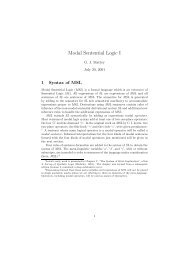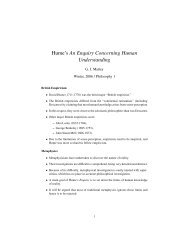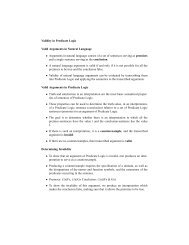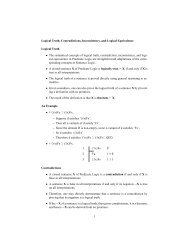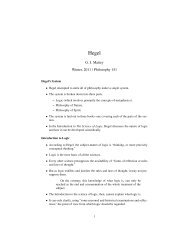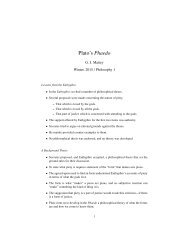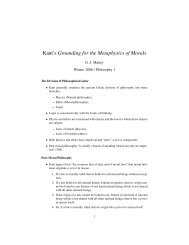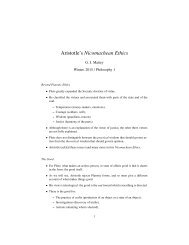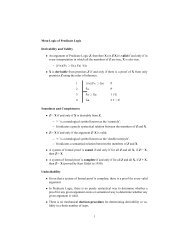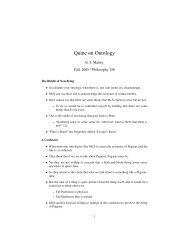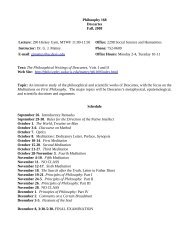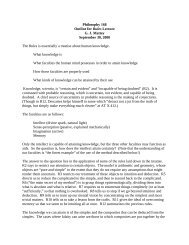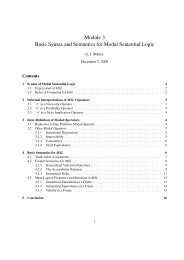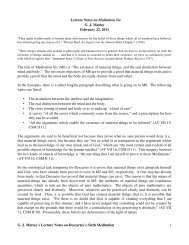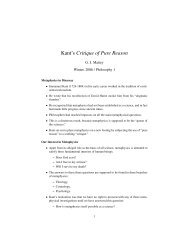PHILOSOPHY 13 - the UC Davis Philosophy Department
PHILOSOPHY 13 - the UC Davis Philosophy Department
PHILOSOPHY 13 - the UC Davis Philosophy Department
Create successful ePaper yourself
Turn your PDF publications into a flip-book with our unique Google optimized e-Paper software.
SUMMER<br />
SESSION I<br />
June 25 – August<br />
3, 2007
<strong>PHILOSOPHY</strong> 5<br />
TEXTS:<br />
CRITICAL REASONING<br />
Lucas Halpin<br />
TWR 7:30-9:45 A.M., 233 Wellman<br />
CRN: 58880<br />
Critical Thinking, Moore and Parker<br />
Dialogues on Natural Religion, Hume<br />
COURSE CONTENT: Emphasis will be on <strong>the</strong> development of various<br />
critical skills, e.g., identifying <strong>the</strong> structure of<br />
arguments, recognizing deductive or inductive<br />
validity of various arguments, detecting fallacies,<br />
and applying critical reasoning in everyday life and<br />
across various fields (e.g. science, philosophy,<br />
politics, and ethics). Special topics of discussion<br />
will include <strong>the</strong> war in Iraq, and arguments for <strong>the</strong><br />
existence of God.<br />
REQUIREMENTS:<br />
PREREQUISITES:<br />
GE CREDIT:<br />
Two short papers, one midterm, and one final.<br />
None<br />
Writing Experience<br />
* * * *<br />
<strong>PHILOSOPHY</strong> 5<br />
TEXTS:<br />
CRITICAL REASONING<br />
Gina Calderone<br />
TWR 5:10-7:25 P.M., 212 Wellman<br />
CRN: 58881<br />
Critical Thinking, Moore and Parker<br />
A Rulebook for Arguments, 3 rd ed., Anthony Weston<br />
COURSE CONTENT: Emphasis will be on <strong>the</strong> development of various<br />
critical skills, e.g., identifying <strong>the</strong> structure of<br />
arguments, recognizing deductive validity or<br />
inductive strength of various arguments, detecting<br />
fallacies, and applying critical reasoning in everyday<br />
life and across various fields (e.g. science,<br />
philosophy, politics, and ethics). Special emphasis
is placed on practical techniques for identifying <strong>the</strong><br />
source of two-party disagreements, and how to<br />
argue effectively for positions.<br />
REQUIREMENTS:<br />
PREREQUISITES:<br />
GE CREDIT:<br />
Two short papers, homework and in-class<br />
exercises, and a final exam.<br />
None<br />
Writing Experience<br />
* * * *<br />
<strong>PHILOSOPHY</strong> <strong>13</strong><br />
TEXT:<br />
Minds, Brains, and Computers<br />
David Byrd<br />
MTWR 10:00-11:40 A.M., 1128 Hart<br />
CRN: 58883<br />
Minds, Brains, and Computers, Robert Cummins<br />
and Denise Cummins<br />
COURSE CONTENT: This is an entry level course in <strong>the</strong> foundations of<br />
mind science. It asks <strong>the</strong> questions, “What would it<br />
take to construct a genuine science of <strong>the</strong> mind,<br />
what would be <strong>the</strong> structure of such a science, what<br />
would it explain, and how would it explain it? The<br />
material lies at <strong>the</strong> interface of philosophy of mind<br />
on <strong>the</strong> one hand, and neuroscience, artificial<br />
intelligence/life, and cognitive psychology and<br />
anthropology on <strong>the</strong> o<strong>the</strong>r (<strong>the</strong> “cognitive sciences”<br />
as usually construed). It thus introduces <strong>the</strong> student<br />
to a variety of scientific material related to <strong>the</strong> mind,<br />
with an eye to gaining a critical understanding to<br />
how such materials should or do constrain our<br />
conception of <strong>the</strong> mind and its place in evolution<br />
and natural order.<br />
REQUIREMENTS: Three short papers, 3-4 pages each, worth 25%<br />
each. A final examination worth 25% is also<br />
required.
PREREQUISITES:<br />
One course in philosophy recommended.<br />
******<br />
<strong>PHILOSOPHY</strong> 15<br />
TEXT:<br />
BIOETHICS<br />
Jonathan Dorsey<br />
TWR 12:40–2:20 P.M., 233 Wellman<br />
CRN: 58884<br />
The Elements of Moral <strong>Philosophy</strong>, 5 th edition,<br />
Rachels<br />
Bioethics, 2 nd edition, Kuhse and Singer<br />
COURSE CONTENT: The course is designed to give students practice<br />
with reasoning in a philosophical way about ethical<br />
issues. We will first examine some “normative”<br />
ethical views, which are specific to no particular<br />
ethical issue. We will <strong>the</strong>n spend <strong>the</strong> rest of <strong>the</strong><br />
course on topics in biomedical ethics, which, to<br />
name a few, range from <strong>the</strong> cloning of humans, to<br />
<strong>the</strong> selling of kidneys, to physician-assisted suicide.<br />
REQUIREMENTS:<br />
PREREQUISITE:<br />
G.E. CREDIT:<br />
Two papers (4-5 pages each), and a final exam.<br />
One previous course in philosophy.<br />
Arts and Humanities, Writing Experience<br />
******<br />
<strong>PHILOSOPHY</strong> 21<br />
TEXTS:<br />
HISTORY OF <strong>PHILOSOPHY</strong>: ANCIENT<br />
Regina Milano<br />
TWR 5:10-7:25 P.M., 1128 Hart<br />
CRN: 61269<br />
Readings in Ancient Greek <strong>Philosophy</strong>: From<br />
Thales to Aristotle, 3 rd edition, edited by S. Marc<br />
Cohen, Patricia Curd, & C. D. C. Reeve.<br />
Additional readings will be provided in class.
COURSE CONTENT: This course is designed to acquaint students with<br />
key issues in ancient Greek philosophy. We will<br />
focus primarily upon <strong>the</strong> Presocratic philosophers,<br />
Socrates, Plato, and Aristotle. Hellenistic philosophy<br />
will also be introduced.<br />
REQUIREMENTS:<br />
PREREQUISITE:<br />
G.E. CREDIT:<br />
Weekly written assignments, a mid-length paper, a<br />
midterm, and a final exam.<br />
None<br />
Art and Humanities, Writing Experience<br />
******<br />
<strong>PHILOSOPHY</strong> 38<br />
TEXTS:<br />
INTROD<strong>UC</strong>TION TO <strong>PHILOSOPHY</strong> OF BIOLOGY<br />
Nate Smith<br />
TWR 7:40-9:55 P.M., 115 Wellman<br />
CRN: 58885<br />
<strong>Philosophy</strong> of Biology, 2 nd edition, Elliott Sober<br />
COURSE CONTENT: The focus of this course will be a detailed<br />
examination of some of <strong>the</strong> key concepts of<br />
evolutionary <strong>the</strong>ory. What is evolutionary <strong>the</strong>ory and<br />
how does it work? What is fitness? What are <strong>the</strong><br />
objects on which natural selection operates? What<br />
should we make of “adaptationist” explanations?<br />
What are species and how should we classify living<br />
things? Time permitting, we may also take a look at<br />
some ethical issues related to thinking about <strong>the</strong><br />
biological world. We will approach all of <strong>the</strong>se topics<br />
in a non-technical way that assumes no prior<br />
background in ei<strong>the</strong>r biology or philosophy.<br />
REQUIREMENTS:<br />
PREREQUISITES:<br />
Grades will be based on class participation, short<br />
weekly writing assignments, and a final exam.<br />
None.
G.E. CREDIT:<br />
Arts and Humanities, Writing Experience.<br />
******<br />
<strong>PHILOSOPHY</strong> 103<br />
TEXTS:<br />
<strong>PHILOSOPHY</strong> OF MIND<br />
David Byrd<br />
MTWR 12:10-1:50 P.M., 1<strong>13</strong>0 Bainer<br />
CRN: 58886<br />
<strong>Philosophy</strong> of Mind: Classical and Contemporary<br />
Readings, edited by David J. Chalmers<br />
COURSE CONTENT: This course will cover three of <strong>the</strong> main topics in <strong>the</strong><br />
philosophy of mind. First, <strong>the</strong> mind/body problem:<br />
What is <strong>the</strong> relation between mental and physical<br />
events? Is one a kind of <strong>the</strong> o<strong>the</strong>r? Are <strong>the</strong>y<br />
distinct? Second, and closely related to <strong>the</strong> first,<br />
consciousness: how does consciousness fit into our<br />
modern materialistic view of <strong>the</strong> world? Third,<br />
mental content: what determines <strong>the</strong> contents of our<br />
out thoughts? How are our thoughts about<br />
something else? These and related questions will<br />
be addressed in this survey course.<br />
REQUIREMENTS:<br />
PREREQUISITE:<br />
G.E. CREDIT:<br />
Two 5-page papers: 33% each<br />
Final exam: 34%.<br />
None<br />
Art & Humanities, Writing Experience.<br />
******<br />
<strong>PHILOSOPHY</strong> 105<br />
TEXT:<br />
<strong>PHILOSOPHY</strong> OF RELIGION<br />
Dennis Holden<br />
TWR 10:00–12:15 P.M., 105 Olson<br />
CRN: 58887<br />
<strong>Philosophy</strong> of Religion, 4 th edition, Louis P. Pojman
COURSE CONTENT: We will begin <strong>the</strong> course by examining <strong>the</strong><br />
possibility of an afterlife. We shall <strong>the</strong>n focus on <strong>the</strong><br />
existence of a supreme being (God), considering<br />
first reasons for accepting <strong>the</strong> view that such a<br />
being exists and <strong>the</strong>n reasons for rejecting this<br />
view. Finally, we shall examine <strong>the</strong> interplay<br />
between “faith” and “reason.”<br />
REQUIREMENTS:<br />
PREREQUISITE:<br />
G.E. CREDIT:<br />
Two mid-term exams and a final examination.<br />
One course in philosophy is recommended.<br />
Arts & Humanities, Writing Experience<br />
******



